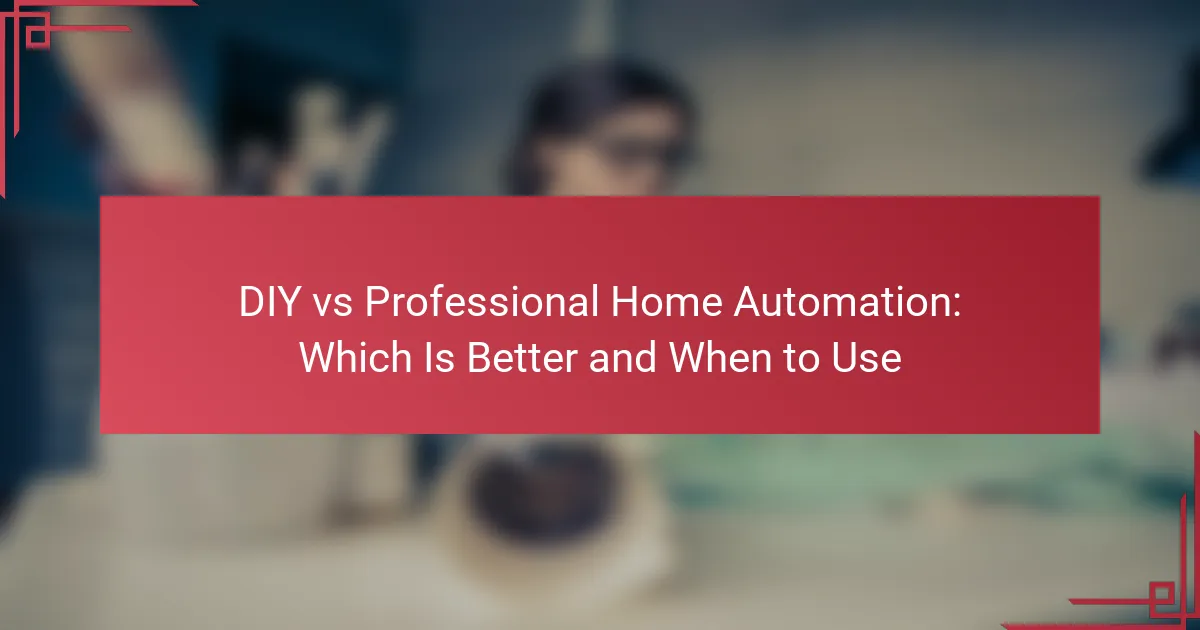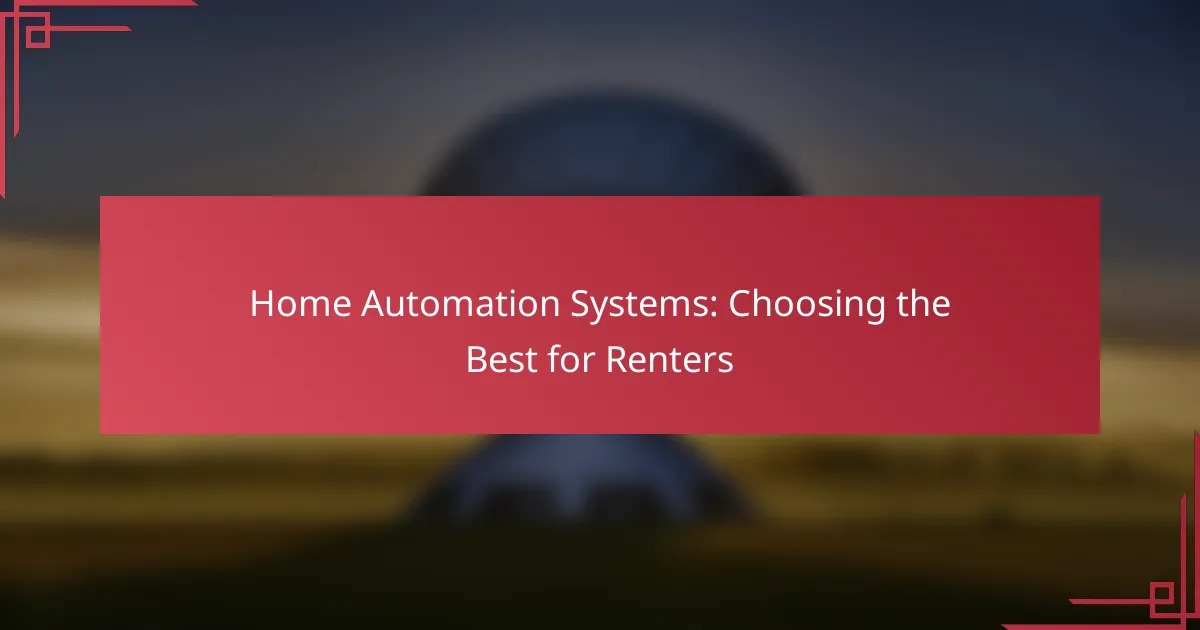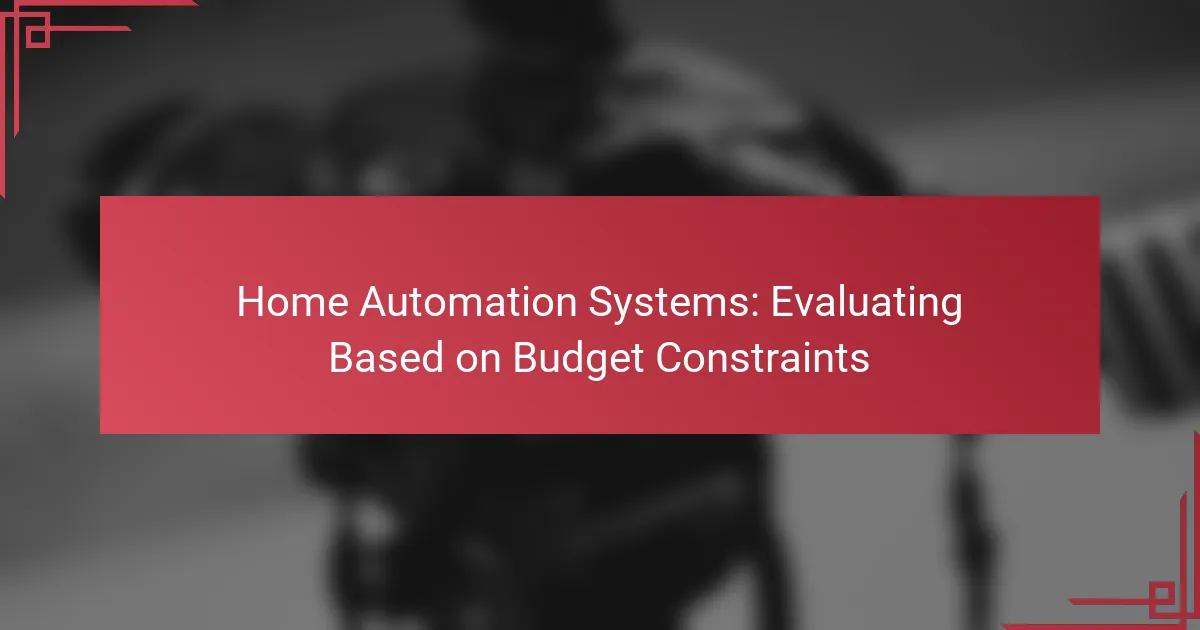When considering home automation, homeowners often face the decision between DIY solutions and hiring professionals. DIY home automation can provide cost savings and customization opportunities, allowing individuals to tailor systems to their preferences. However, for complex projects or those requiring seamless integration with existing technology, professional services may be the better choice to ensure efficient and correct installation.

What are the benefits of DIY home automation in Ireland?
DIY home automation in Ireland offers several advantages, including cost savings, customization, and the opportunity to learn new skills. By taking a hands-on approach, homeowners can tailor their systems to fit their specific needs without the added expense of hiring professionals.
Cost savings
One of the primary benefits of DIY home automation is the potential for significant cost savings. By purchasing devices directly and installing them yourself, you can avoid labor costs that often accompany professional installation, which can range from hundreds to thousands of euros depending on the complexity of the system.
Many DIY solutions are available at various price points, allowing you to start small and expand your system over time. This flexibility means you can invest in essential components first and add more features as your budget allows.
Customization options
DIY home automation allows for extensive customization, enabling you to create a system that perfectly meets your lifestyle and preferences. You can choose from a wide range of devices, including smart lights, thermostats, and security cameras, and configure them to work together seamlessly.
With DIY systems, you have the freedom to experiment with different setups and functionalities. For example, you can set specific schedules for lighting or create automation routines that suit your daily habits, something that may not be as easily achievable with a pre-packaged professional solution.
Learning experience
Engaging in DIY home automation provides a valuable learning experience that can enhance your technical skills. As you install and configure devices, you will gain insights into how these technologies work and how to troubleshoot common issues.
This hands-on experience can be empowering, making you more confident in managing your home technology. Additionally, the knowledge gained can be beneficial if you decide to expand your system or make upgrades in the future, allowing you to adapt to new advancements in home automation technology.
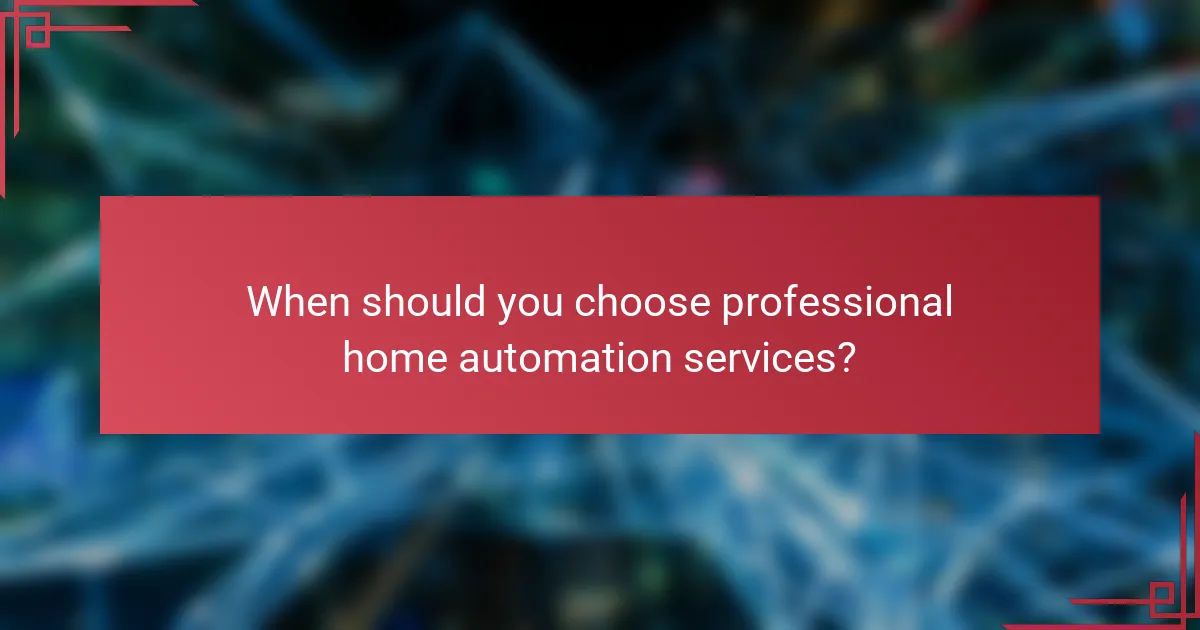
When should you choose professional home automation services?
Choosing professional home automation services is ideal when your project involves complex systems, tight timelines, or existing technology that needs seamless integration. Professionals can ensure that installations are done correctly and efficiently, minimizing potential issues.
Complexity of installation
Complex installations often require specialized knowledge and skills that DIY enthusiasts may lack. For example, integrating multiple smart devices, setting up a home theater system, or configuring advanced security features can be intricate. Professionals are trained to handle these complexities, ensuring that everything works together smoothly.
Additionally, if your home requires extensive wiring or the installation of specialized equipment, hiring an expert can save you time and prevent costly mistakes. They can navigate local building codes and regulations, ensuring compliance and safety.
Time constraints
If you have limited time to dedicate to a home automation project, hiring professionals can be a wise choice. Professionals can typically complete installations in a fraction of the time it would take an inexperienced individual. This is particularly beneficial for those with busy schedules or urgent needs.
Moreover, professionals can often provide immediate support and troubleshooting, which can be invaluable if issues arise during installation. This efficiency can lead to a quicker transition to a fully automated home.
Integration with existing systems
Integrating new automation systems with existing technology can be challenging. Professionals have the expertise to assess your current setup and ensure that new devices are compatible and function as intended. This is especially important for older homes where technology may not be standardized.
For example, if you have a legacy security system or older lighting fixtures, a professional can recommend the best solutions for integration. They can also help you avoid common pitfalls, such as incompatible devices or network issues, which can disrupt your home automation experience.
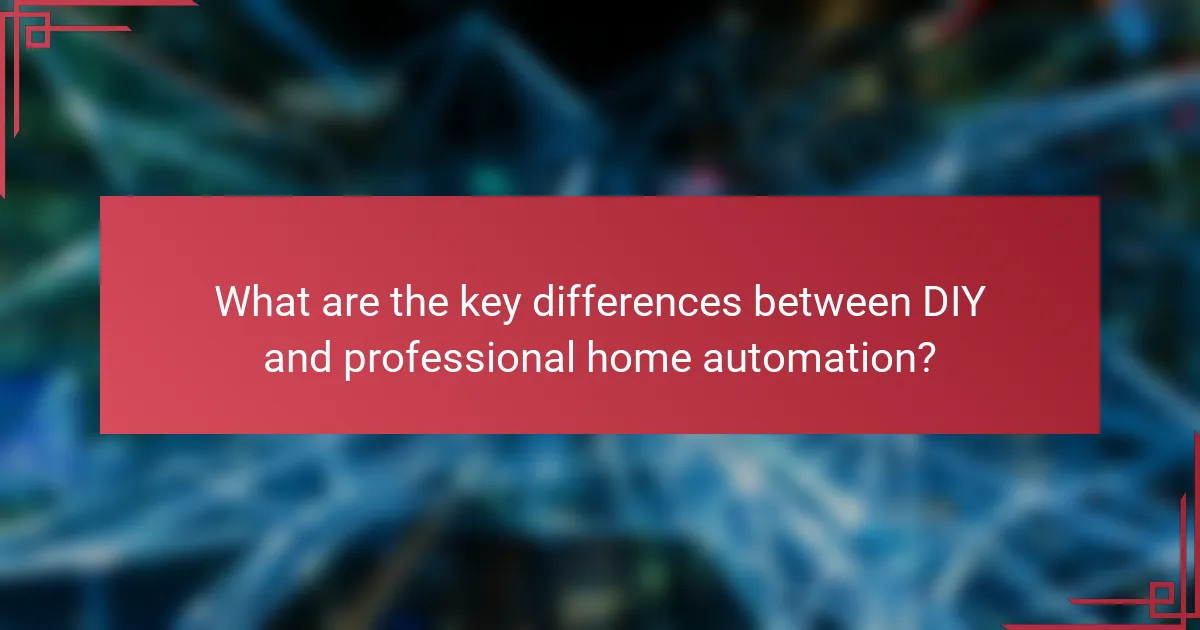
What are the key differences between DIY and professional home automation?
DIY home automation involves self-installation and configuration, while professional home automation relies on expert installation and support. The choice between the two depends on budget, technical skills, and specific needs.
Installation process
The installation process for DIY home automation typically involves purchasing devices and following manufacturer instructions for setup. This can be straightforward for simple systems, but may become complex with multiple devices or integrations.
In contrast, professional installation includes a comprehensive assessment of your home, tailored system design, and expert setup. This can save time and reduce the risk of errors, but often comes with higher costs, ranging from hundreds to thousands of dollars depending on the system’s complexity.
Support and maintenance
DIY systems usually come with limited support, often relying on online resources or community forums for troubleshooting. Users may need to invest time in learning how to fix issues themselves, which can be frustrating for those less tech-savvy.
Professional home automation services typically offer ongoing support and maintenance, ensuring that systems remain functional and updated. This can include regular check-ups and troubleshooting, which can be invaluable for users who prefer not to handle technical problems on their own.
Scalability
DIY home automation allows for gradual expansion, as users can add devices at their own pace based on budget and needs. This flexibility can be beneficial for homeowners who want to start small and expand over time.
On the other hand, professional systems are often designed with scalability in mind from the outset, allowing for seamless integration of new devices. However, this may require additional investment upfront, making it essential to consider future needs when choosing a system.

How to evaluate your home automation needs?
Evaluating your home automation needs involves understanding your specific requirements, technical abilities, and the layout of your home. This assessment will help you determine whether a DIY approach or hiring a professional is the best option for you.
Assessing your technical skills
Your technical skills play a crucial role in deciding between DIY home automation and hiring a professional. If you are comfortable with technology, basic programming, and troubleshooting, you may successfully implement a DIY system. However, if you find technology challenging, a professional may be a better choice.
Consider your experience with similar projects. Familiarity with smart devices, home networks, and installation processes can significantly influence your confidence in managing a DIY setup.
Understanding your home layout
The layout of your home directly impacts the feasibility of various home automation solutions. Assess the size of your space, the number of rooms, and the existing wiring. Larger homes may require more complex systems that could benefit from professional installation.
Take note of areas where you want automation, such as lighting, security, or climate control. Understanding these zones will help you determine the necessary equipment and whether you can handle the installation yourself.
Identifying desired features
Clearly defining the features you want in your home automation system is essential. Common features include smart lighting, security cameras, thermostats, and voice control. Prioritize these based on your lifestyle and budget.
Research the compatibility of devices with your existing systems, as some may require professional installation or specialized knowledge. Creating a list of must-have features versus nice-to-haves can guide your decision-making process effectively.
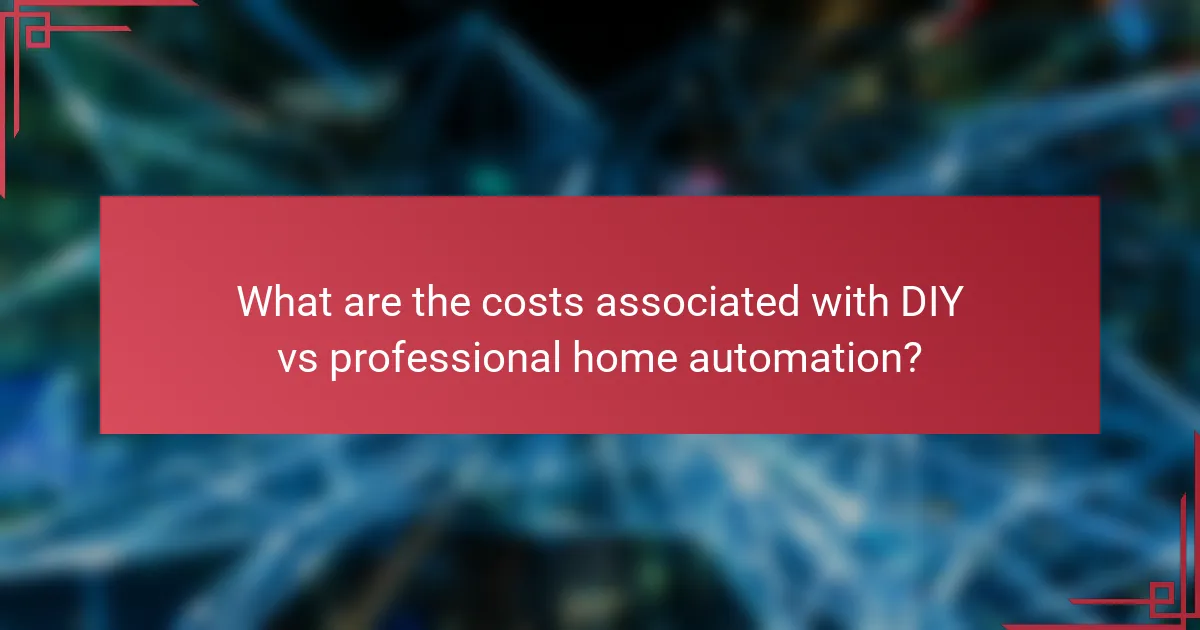
What are the costs associated with DIY vs professional home automation?
The costs of DIY versus professional home automation can vary significantly based on the complexity of the system and the level of expertise required. DIY projects often have lower initial costs but may incur higher long-term maintenance expenses, while professional installations typically involve higher upfront fees but can offer more reliable support and integration.
Initial setup costs
DIY home automation systems usually require a one-time investment in hardware and software, which can range from a few hundred to a couple of thousand dollars, depending on the components chosen. In contrast, professional installation costs can start from around $1,000 and can exceed several thousand dollars for comprehensive systems that include smart lighting, security, and climate control.
When considering initial setup costs, factor in any additional expenses for tools or equipment you might need for installation. For example, if you lack basic tools, this could add to your overall DIY expenses.
Long-term maintenance costs
Long-term maintenance costs for DIY systems can be unpredictable, as they depend on your technical skills and the reliability of the components used. You might save money by troubleshooting issues yourself, but you could also face costs for replacing malfunctioning devices or upgrading software.
Professional systems often come with warranties and support services, which can reduce long-term maintenance costs. However, ongoing service fees or subscription costs for monitoring services can add up over time, so it’s essential to review the terms before committing.
Potential savings
DIY home automation can lead to significant savings in installation costs, especially for smaller projects. Additionally, smart systems can help reduce energy bills by optimizing heating, cooling, and lighting based on usage patterns, potentially saving homeowners tens of percent on their monthly utility bills.
On the other hand, professional installations may offer more efficient systems that can maximize savings through advanced features and seamless integration. Weigh the initial costs against the potential savings to determine which option aligns best with your budget and needs.
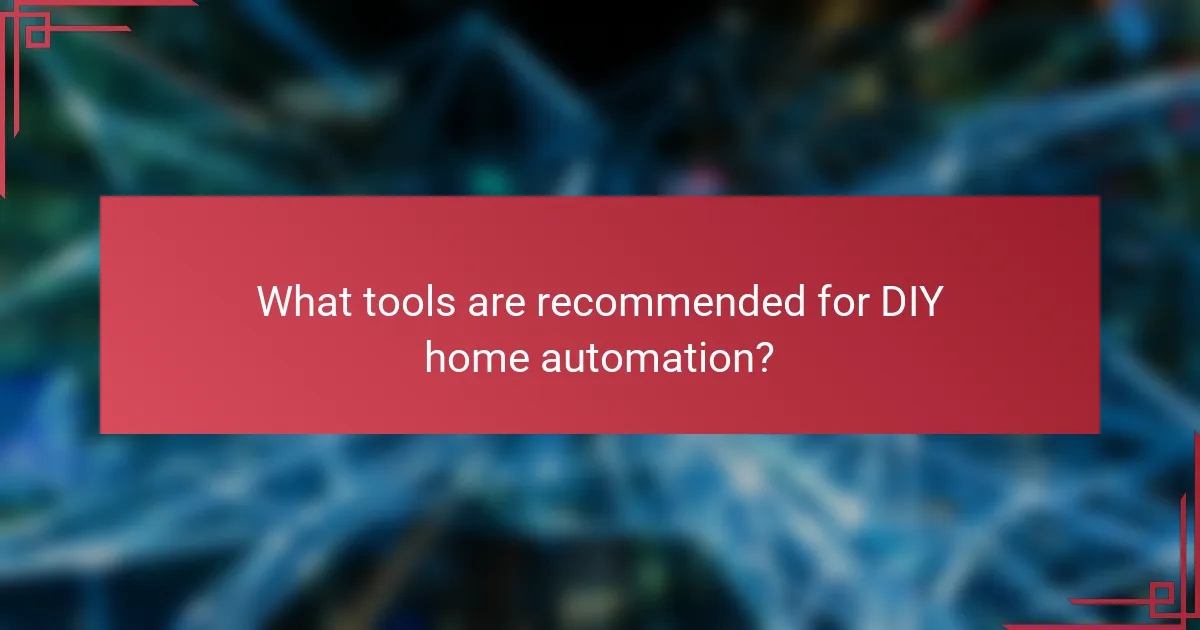
What tools are recommended for DIY home automation?
For DIY home automation, essential tools include smart hubs, smart devices, and compatible apps. These tools enable seamless integration and control of various home automation systems, allowing users to customize their setups according to specific needs.
Smart hubs like Samsung SmartThings
Smart hubs, such as Samsung SmartThings, serve as central control units for various smart devices in your home. They connect and manage devices from different manufacturers, allowing for streamlined automation and communication.
When choosing a smart hub, consider compatibility with your existing devices and the ease of use of its app. A good hub will support a wide range of devices and offer features like voice control and automation routines.
Smart devices from Philips Hue
Philips Hue offers a range of smart lighting solutions that can be easily integrated into your home automation system. These devices allow you to control lighting remotely, set schedules, and create ambiance with customizable colors and brightness.
When using Philips Hue, ensure you have the necessary bridge to connect the lights to your smart hub. Additionally, consider the types of bulbs and fixtures that best fit your space to maximize energy efficiency and aesthetic appeal.
